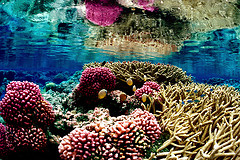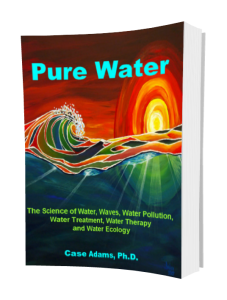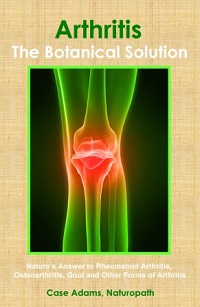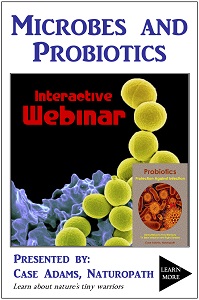Coral Bleaching and Sunlight Exposure
Coral bleaching is harming our oceans and sea life. This endangers our future survival on this planet. Is coral bleaching related to intense sunlight that pierces shallow water?
As the world’s coral reefs are dying – following becoming bleached – for years, marine biologists assumed that the process is driven by sunlight exposure. As it turns out, the process is much more complicated.
Because the observed effect included damage to the tiny algae that coexist with coral reef, and the formation of free radicals that have been seen forming on the algae and coral during periods of light exposure, the assumption was that the sunlight drove the process. This lead many to believe that the increased levels of UVB and UVA due to loss of the ozone layer, and the overheating of the atmosphere is combining to damage the algae that help protect and nourish the coral reef systems.
Separating sunlight from bleaching
Research from the Carnegie Institution for Science in 2013 determined that the epidemic of coral bleaching has nothing to do with sunlight exposure.
The research, led by Dr. Arthur Grossman from the Carnegie Institute, determined that the damage to the algae also equally occurs during darkness – meaning that it is unrelated to sunlight exposure.
This doesn’t mean the process is unrelated to the ocean’s warming, however. But now researchers are beginning to get a better view of the process as it relates to the increase in carbon in the atmosphere, and the subsequent acidification of the oceans that occurs as carbon is taken in by the world’s oceans.
This absorption of carbon effectively decreases the pH of the water, making it harder for the algae to form their calcium carbonate-heavy skeletons.
The algae – single celled zooxanthellae – are important to the coral’s processes because the algae supply various nutrients to the coral – which also allow them to retain their color and health. These nutrients include various amino acids, sugars and oxygen among others.
In turn, the coral feed the algae with various nutrients, and help protect them while providing a platform for their photosynthesis.
This symbiotic relationship has increasingly been damaged with the unfolding acidification of the ocean’s waters. As the waters become more acidic, there are more free radicals present, which in turn damage the algae and the corals.
This is not unlike our bodies – which will also maintain higher levels of free radicals when our circulating fluids are more acidic.
Ocean warming top cause of coral damage
Most ocean research has concluded that the warming of the ocean’s waters and the increasing acidification are the primary causes for coral bleaching. This was one of the conclusions of 2016 research from Northwestern University. The researchers stated that light-scattering may contribute to coral damage, but this is because of the weakening of the coral from warming and acidic waters.
Ocean acidification is also related to pollutants that we keep dumping into the oceans. Pollutants are also linked to red tides.
Marine scientists have estimated that about a quarter of the ocean’s coral reefs are either dead or dying, and by 2050 most if not all of the coral reefs will be dead. All because of our lack of will to utilize alternatives to petroleum.
Learn more about water conservation and the best natural ways to filter drinking water:
Reference
Swain TD, DuBois E, Gomes A, Stoyneva VP, Radosevich AJ, Henss J, Wagner ME, Derbas J, Grooms HW, Velazquez EM, Traub J, Kennedy BJ, Grigorescu AA, Westneat MW, Sanborn K, Levine S, Schick M, Parsons G, Biggs BC, Rogers JD, Backman V, Marcelino LA. Skeletal light-scattering accelerates bleaching response in reef-building corals. BMC Ecol. 2016 Mar 21;16:10. doi:10.1186/s12898-016-0061-4.
Tolleter D, Seneca FO, Denofrio JC, Krediet CJ, Palumbi SR, Pringle JR, Grossman AR. Coral Bleaching Independent of Photosynthetic Activity. Curr Biol. 2013 Sep 4. doi:pii: S0960-9822(13)00864-6. 10.1016/j.cub.2013.07.041.



















